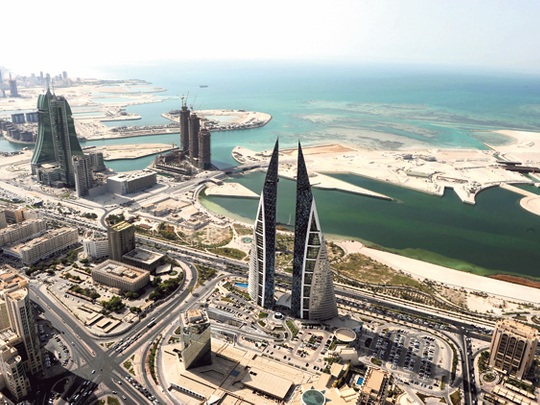
Dubai: Banks and businesses are not leaving Bahrain despite protests in the kingdom. The latest Bahrain spotlight by property consultancy CBRE says that cheap office rents in Dubai, and upbeat economic outlook in Qatar, have not been enough to draw the country's banking and finance industry to new markets.
"It simply hasn't happened at all. Dubai and Qatar have been on about this for years but it is not about office space, it is about regulatory environment," Mike Williams, the author of the report, told Gulf News.
He added that the presence of 435 financial institutions in Bahrain, as well as its history as a banking hub, remained attractive to banks and businesses despite the recent events in the country.
In the report, CBRE points out that while four financial institutions have left Bahrain in 2011, two of these had long planned a move away and the other two have moved to Singapore, not elsewhere in the Gulf.
But a Dubai-based economist told Gulf News yesterday that businesses may be reluctant to move to other jurisdictions in the Gulf due to a concern over being seen to abandon Bahrain.
"To do so could be seen as an insult to Bahrain and to the Saudis as well," the economist, who declined to be named, said.
"But what you may see is a reduction in head count and a reluctance to keep the same amount of people there."
Investment
At the same time, the report has found that the expansion plans of many businesses in Bahrain have been hampered by the events of 2011, and investment and business development in the country has been "subdued".
This has exacerbated the problem with a glut of real estate growing by the day, but tenants that are not willing to commit to large scale, high-end property.
Meanwhile, Williams said a further 170,000 square metres of commercial office space due to come online in 2011 — adding to the 660,000 currently in Manama — the problem is not likely to go away.
"That is why the rents are dropping," Williams said. "It is a substantial amount of space in a market that is not doing much at the moment."
Williams added that CBRE's operations during the unrest in Bahrain — which saw protests engulf the capital for several weeks — was relatively unaffected, with employees only forced to stay at home for four days in total.
"There was a lot of international hysteria but on the ground it wasn't like that," he said.
Summarising the state of Bahrain in July 2011, CBRE's report pointed out that Bahrain's government announced last month that talks would take place between the various opposition groups. It says that newly-approved government budgets aim to provide a boost following the unrest, with government income forecast at 2.29 billion dinars (Dh22.22 billion) with expenditure forecast at 3.12 billion dinars — a deficit of 836 million dinars.
Meanwhile, in 2012, government income is forecast to be 2.35 billion dinars with expenditure forecast at 3.07 billion — a deficit of a further 726 million dinars.
The balance of funds required to support the government's projected spending over the next two years will be met by loans from the Arab Islamic Fund and other financial institutions.
Bahrain's Central Bank has issued another eight licences for financial institutions setting up in the kingdom in 2011.
Landlords refuse to lower rents
Bahraini landlords are leaving properties empty rather than renting them at cheaper prices.
A CBRE report says that while rents in the commercial and residential markets continue to slide, landlords are reluctant to lower rents any further.
This has resulted in a "Mexican stand-off" situation, with landlords unwilling to rent and tenants unwilling to pay more.
Plummeting rates
"It's just a characteristic of local landlords," explained Mike Williams, CBRE senior director in Bahrain. "They tend to establish in their own minds the price they believe to be the value of something, and they would rather let it sit empty than rent it [for less]."
A massive increase in high-end property coming online in the last 12 months has led to rates at some of Manama's most exclusive areas plummeting, meanwhile, some developers have been dividing larger projects in order to rent them more easily.
"The sheer volume of luxury apartments built in Bahrain over the last three years has been too much for the market to absorb in terms of sales alone, hence the adjustments that are taking place in terms of use and tenure," the report says.









